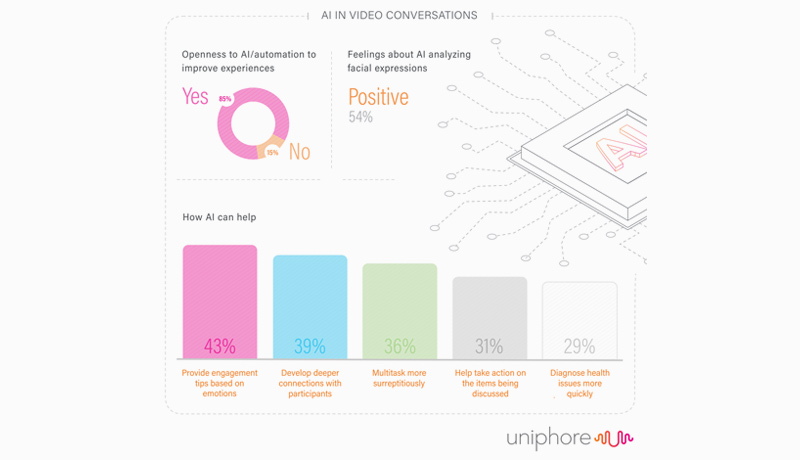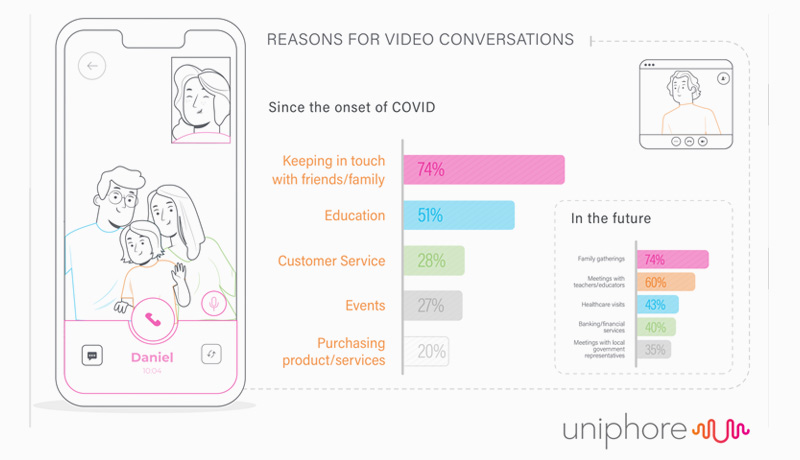
Uniphore, a Conversational Service Automation (CSA) company, has revealed survey results that show UAE consumers are eager to use artificial intelligence (AI) technologies in order to improve their experiences.
Since the outbreak of the Covid-19 pandemic, video calls have become more widely used in practically every aspect of life. According to the poll, there is a gap between the benefits of video discussions and the unforeseen consequences. The findings also revealed that UAE customers are eager to use artificial intelligence (AI) technologies in order to improve their experiences. When it comes to the rise of video calls over the last 18+ months, local customers have expressed a mix of frustration and gratitude for the benefits of video discussions.

Conversations on video have a number of evident advantages, according to respondents, including higher engagement rates. When employing video, the majority of respondents (74%) said they felt their audience was somewhat, very, or highly engaged with them. Furthermore, 45 percent of participants stated that video calls allow them to have a deeper connection with others. This is especially critical for discussions that involve empathy or trust, such as connecting with family, scheduling telemedicine consultations, or conversing with financial institutions or advisors.
More than half of UAE consumers (56%) said they spent much more time watching video last year than they had in previous years. During video chats, participants acknowledged to undertaking a variety of non professional multitasking, personal chores, and other projects, such as web browsing, online buying, and social media scanning.
Surprisingly, they also reported the following activities during video calls:
When questioned about the aspects of conducting a video chat that they dislike, respondents said boredom and that they would prefer the ability to multitask during meetings (29 percent ). Being ‘camera-ready’ was also noted as a major concern: 35% of UAE respondents dislike having to “get ready,” and 29% loathe seeing oneself on camera. Finally, respondents identified physical and mental tiredness as a barrier with video conversations, with nearly one-third (33%) saying it’s difficult to stay focused and energised, and another 31% saying it’s difficult to discern if others are interested or not.
“Since the start of the pandemic we’ve witnessed the widespread adoptionof video conversationsacrosspersonal and professional engagements. As the survey results revealed, there is still work to do to make virtual interactions as seamless and effective as in-personconversations,” said Umesh Sachdev, CEO and co-founder of Uniphore.
Also added, “There is a clear need for additional tools and capabilities to enhance higher degrees of people-to-people understanding. Through AI and automation technology, companies and business leaders can create better experiences for customers, pick up on nonverbal cues that they may have missed, and provide insights using data that is decipherable and actionable.”

While the video is utilised for a variety of purposes today, it is evident that technology can improve the effectiveness and enjoyment of these video chats. An overwhelming majority (85 percent) of UAE respondents stated they would be open to employing automation or AI techniques to improve video chats, according to the study results. AI might provide engagement advice based on emotion analysis (43 percent), create deeper connections with users (39 percent), and multitask more discreetly, according to respondents (36 percent ).
Uniphore purchased Emotion Research Labs and Jacada earlier this year in order to improve customer experiences by combining video and emotion AI capabilities with low-code automation technologies. Companies may improve communication by adding the ability to better analyse participant engagement levels and emotions, and ultimately create better business results, using AI and machine learning. Uniphore is the only provider that can offer a full platform that includes low-code/no-code capabilities as well as best-in-class speech and video AI and automation.
